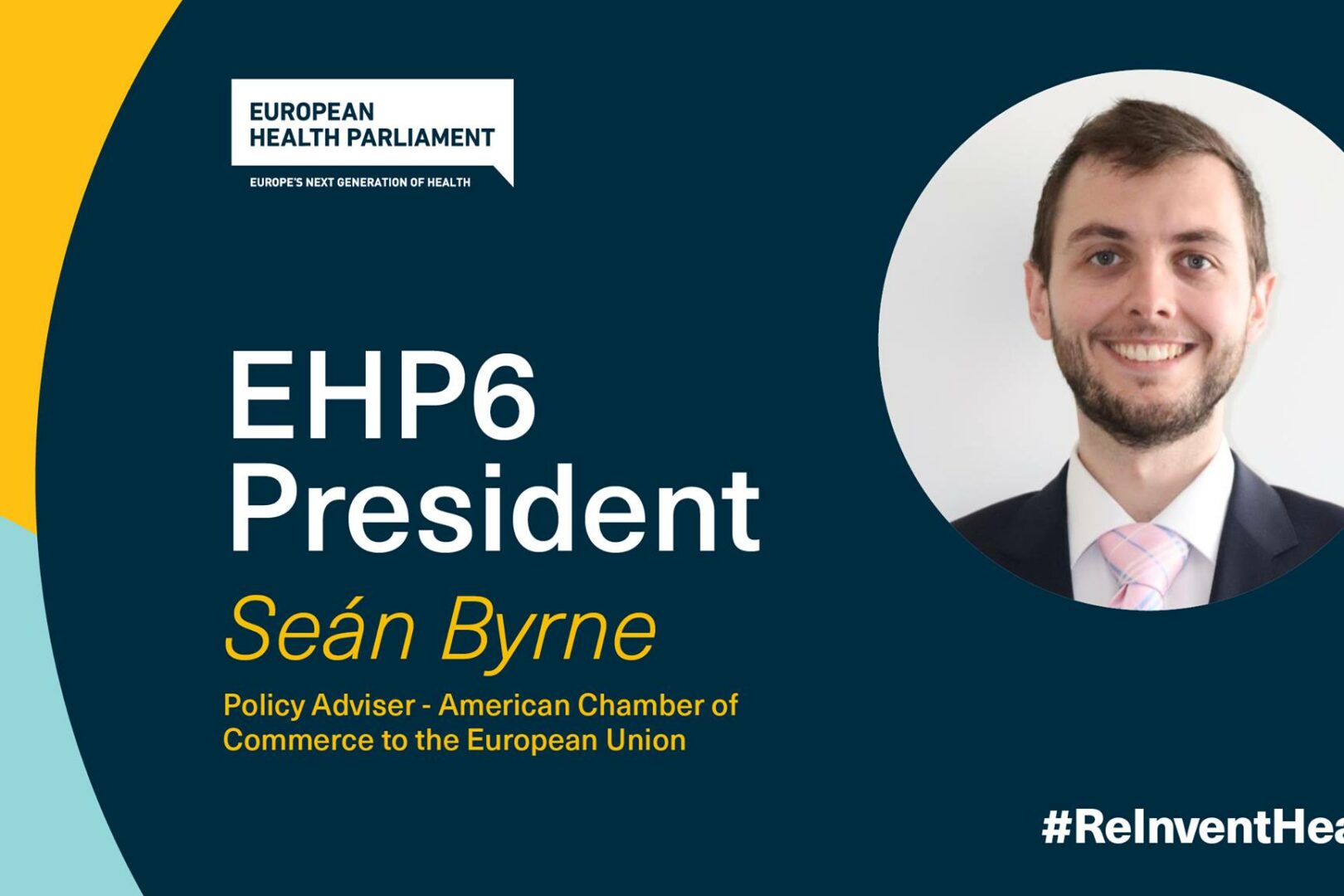Interview with Dr. Seán Byrne, President of the 6th edition of the European Health Parliament
Conducted by Sergey Golyshin, Mavence Consultant
***
Sergey Golyshin: The 6th edition of the EHP took place during an particularly difficult and unique moment – in the midst of a global pandemic. What motivated you to get involved, and in particular become President?
Seán Byrne:
Personally I think we’re at a turning point for the direction healthcare is going to take for the next few generations, and I wanted to be a part of shaping that; the policy decisions that are being taken, in a context in which health has rarely been so dominant in the public discourse, make this a uniquely motivating position.
Aside from the health policy landscape, I also saw it as a great opportunity to get to know peers from across Europe that are equally interested in these issues. Given that shared policy interest, it’s likely we’re going to continue to cross paths for a large portion of our careers as well – in that sense the European Health Parliament is a unique way to get to know each other personally and professionally, and during a pandemic the opportunities for that kind of meaningful network and relationship building are even more valuable. From this experience, it doesn’t matter where someone lives, works, or what their background is – working on our recommendations we all shared a common goal.
***
S. Golyshin: How would you describe the impact that the European Health Parliament and its traditional outputs can have under the circumstances, and what does that mean for shaping health policies in the current climate?
S. Byrne: In terms of outputs, ultimately we are still producing the same booklet of recommendations as in previous editions of the EHP – on paper, at least, there is really no difference to speak of. That being said, this year we’ve been able to leverage the fact that we’ve had to move online while teleworking has become the norm, and in that context we’ve been able to interact with a lot of different and diverse stakeholders. Everyone has had to communicate online, and this tended to make people more flexible in terms of fitting in meetings which might otherwise have been difficult to arrange.
***
S. Golyshin: Where do you see the most marked value from driving policy change via these kind of inclusive, participatory initiatives, in particular with a next-generation focus as in the case of the EHP?
S. Byrne: I think it works well in two ways in particular: on the one hand, a move obvious reflection is that youth perspectives tend to be less entrenched – I believe that this makes us more likely to tackle an issue objectively and propose a new path, or at the very least able to more easily decouple personal positions based on long-established professional lines when presented with new arguments or strong counterpoints. On the other hand, the structure allows each new cohort to be confronted with common issues in policy drafting – what are the practical limitations of what you want to achieve; what systems are currently in place; do several bodies or agencies already fulfill a certain role; and above all, the real world requirements of compromise and team work.
Taking it all together, not only do we provide a fresh perspective, we also get to carry the experience forward in our career – that exercise in collaborative problem solving is vital for conditioning an open mind and constructive mindset whether we go on to work in health policy, as healthcare professionals, or in another capacity entirely. That’s a powerful benefit to anyone working in an area we know is personal and sensitive – it makes for policy change that is much more holistic.
***
S. Golyshin: Participation in these types of initiatives are often voluntary, and depend on the skills and motivation that the individuals themselves bring to the table; how does their work within the context of the EHP bridge into their respective professional careers?
S. Byrne: Their experience is truly invaluable – when you’re busy working to deadlines and trying to juggle other activities, such as family, class, work etc. it’s easy to overlook that so are the others around you in EHP. No matter what, as you progress in your careers you bring those shared experiences and shared connections with you, which helps build professional skills as much as it does professional empathy. In more concrete terms, it’s also an immediate door opener: every EHP alumni I’ve met is immediately proud to share with you that they too were involved and that their cohort did real work tackling one challenge or another.
***
S. Golyshin: As with any public policy or advocacy initiative on better regulation, making your voice heard – as a group but also as individuals – is central to effectively shaping the conversation or moving political discourse on important topics; based on your experience, what steps can be taken to help safeguard and grow that engagement and that reach?
S. Byrne: Growing and focusing on the alumni network is an important priority that needs to be realized in order to make the best use of the contacts that we have per cohort, and to continue to build connections with the EHP participants that came before us. Having a strong alumni network would also help disseminate the recommendations each new EHP edition brings, and ultimately would allow for strong connections between the next generation of healthcare leadership across Europe and the world.
***
S. Golyshin: Last year, Mavence produced a study on the impact of Covid-19 on professionals and organizations active in EU public affairs in Brussels and beyond. One of the more surprising outcomes of our research was that over 90% of respondents assessed their organization’s response as some degree of ‘positive’ or ‘mixed’, with only a small minority of respondents reporting ‘poor’ or ‘very bad’. Ahead of the 3rd plenary session and already well into the global response to Covid, what is your own impression of how the organizers and associated organizations have adapted?
S. Byrne: Overall I think the experience was positive – at least well handled – so I would agree with that 90% finding, adding that it’s never easy to coordinate an event and a group of people, whether it’s online or in person. Despite the challenges, this year we’ve had access to plenaries, trainings, and opportunities to meet and discuss, and the results of that work reflect the effort that was made in responding to the organizational challenges we faced – being able to provide a seamless experience online is a testament to the dedication people have to EHP, and while ultimately it’s based on people volunteering their time, the quality of interactions has been brilliant.
***
S. Golyshin: To conclude, is there any advice you could give to future presidents or EHP members that might help inform or guide participation and professional development in particular?
S. Byrne: Enjoy the experience – there are no mistakes to be made in exploring a disruptive idea, and it’s a very open and engaging platform to learn that you don’t always find as you grow in your career. Apart from being guided in terms of overarching topic, EHP participants are free to delve into issues whatever way their committees see fit – take advantage of that freedom. In so doing, you get to learn and exchange more, develop great skills in policy drafting and team work, and hopefully have some fun along the way.


